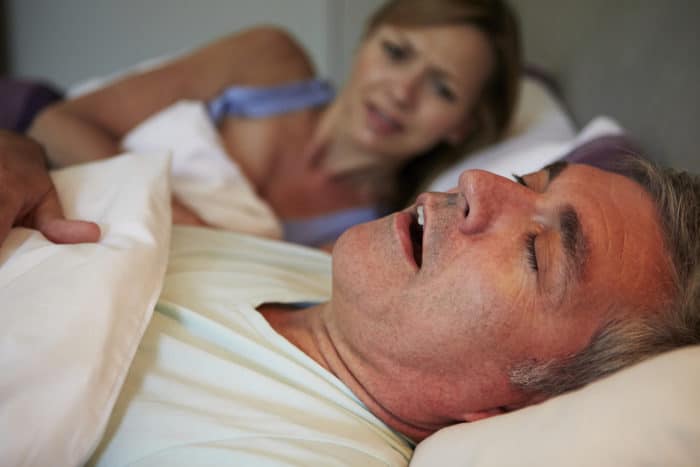
What is Sleep Apnea?
Even though you’ve had a full night of sleep, you wake up feeling exhausted and have problems concentrating throughout the day. People around you may also complain about loud snoring during the night.
If this is the case, you may have sleep apnea, a common sleep disorder in which breathing stops or gets very shallow during sleep.
More people should be asking about sleep apnea since it affects over 18 million adults in the US alone.
These breathing pauses can last from a few seconds to minutes and may occur 30 times or more an hour in some individuals. The breathing interruptions may limit the supply of oxygen.
As the brain and body become oxygen deprived, normal sleep cycles are disturbed when you fall out of restorative deep sleep into light sleep. The result is that you wake up feeling unrested.
Most people are not aware they are having these breathing interruptions during the night. It may first be noticed by a bed partner or roommate who might also complain to you about snoring.
There are three types of sleep apnea:
Obstructive sleep apnea, the most common sleep apnea, is a mechanical problem. It occurs when muscles in the throat relax during sleep. This causes the airway to collapse, interrupted breathing, and loud snoring.
Central sleep apnea is a communication problem. It occurs when the brain fails to send the right signals to the muscles that control breathing. People with this sleep apnea seldom snore.
Complex sleep apnea occurs when individuals experience symptoms of both obstructive and central sleep apnea. Sometimes patients being treated with CPAP for obstructive sleep apnea develop central sleep apnea.
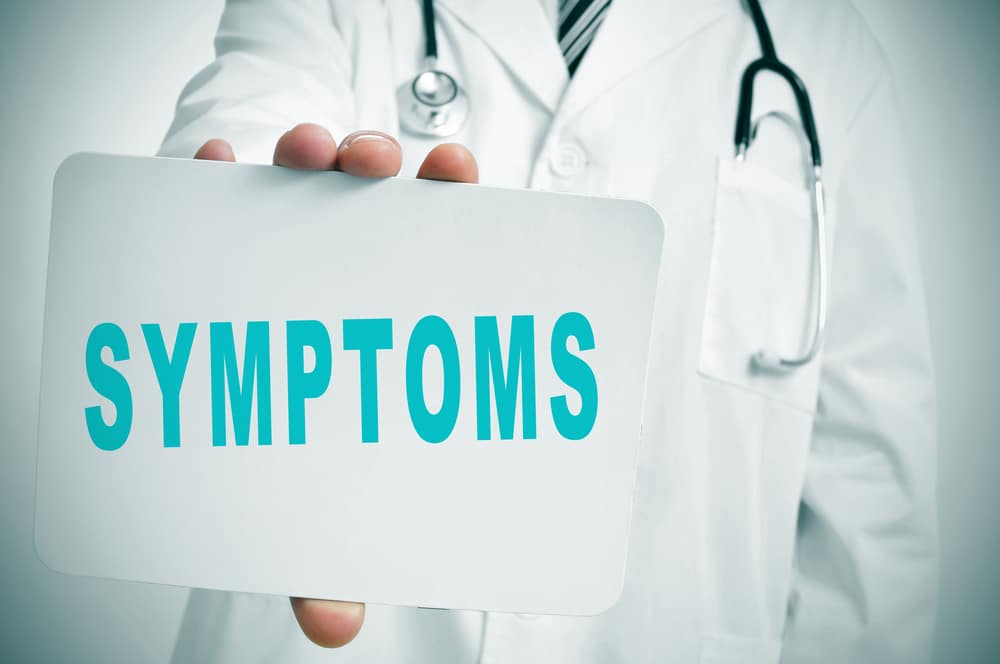
What are the symptoms of sleep apnea?
If you’re still wondering what is sleep apnea, think about it in terms of symptoms…
- Pauses in breathing while asleep
- Choking, gasping, or snorting sounds
- Loud snoring, although not all people who snore have sleep apnea
- Dry mouth or sore throat
- Difficulty staying asleep
- Waking up frequently to urinate
- Morning headaches
- Fatigue during the day
- Excessive daytime sleepiness
- Irritability or mood swings
- Attention, memory, or learning problems

What are the risk factors for sleep apnea?
- Weight – about half of people with sleep apnea are overweight
- Being male – sleep apnea is more common in men than women
- Middle aged – risk increases as you get older
- Family history of sleep apnea
- Large neck – greater than 16-17 inches
- High blood pressure – very common in people with sleep apnea
- Enlarged tonsils or tongue – may block the airway
- Alcohol, sedatives – they relax the muscles in your throat
- Smoking – may irritate and inflame the upper airway
- Allergies, nasal congestion – you’re more likely develop sleep apnea if you have difficulties breathing through nose
- Other conditions – people who’ve had heart failure or a stroke are more at risk for central sleep apnea
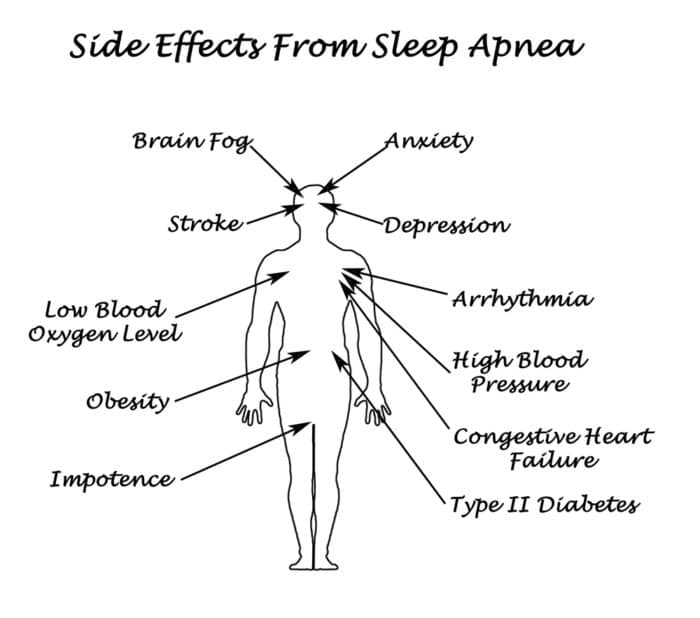
Sleep apnea can have very serious health effects
If left untreated, sleep apnea and the lack of oxygen your body suffers from can have long-term effects on your health. It has been linked to high blood pressure, heart disease, stroke, diabetes, and depression.
Also, sleep apnea disturbs normal sleep cycles which can result in poor quality sleep. Besides waking up exhausted, poor sleep on a regular basis can put you at risk for other medical conditions.
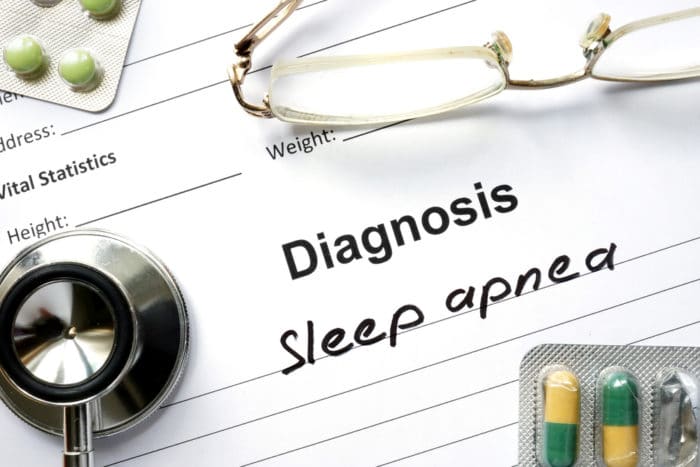
How is sleep apnea diagnosed?
Knowing what is sleep apnea is just the first step – you have to figure out if you have it.
Unfortunately, many people with sleep apnea are not aware they have a sleep disorder. In fact, officials estimate that there are 10 million undiagnosed Americans.
If you suspect you have sleep apnea, it’s important to see a doctor. Diagnosis will involve a review of medical and family histories, risk factors, a physical exam, and tests to assess your sleep patterns.
If you have symptoms of sleep apnea, you may be referred for a polysomnogram, the gold standard for diagnosing sleep disorders. It’s an overnight sleep study that tracks brain activity, heart rate, blood pressure, blood oxygen, air movement, and snoring.
Your doctor may also want to do a multiple sleep latency test which will measure how quickly you nod off to sleep during the day.
You can learn more about sleep disorders diagnosis here.

How is sleep apnea treated?
Treatment is based on your individual situation.
The goal is to restore regular breathing during sleep, relieve snoring, and help you wake up feeling more rested.
Treatment can include a variety of things based on the severity of your sleep apnea:
1) Lifestyle changes. For mild sleep apnea, changes in daily activities and habits might be enough to improve your situation. This could include maintaining a more regular sleep routine, avoiding substances like alcohol that make that may relax your throat muscles too much, and quitting smoking. Learn more about lifestyle changes here.
2) Positional therapy. Sleeping on your side instead of your back may help keep your throat open.
3) Nasal decongestants. Nasal decongestants or allergies medications might be recommended to improve airflow through the nose. Learn more here.
4) Adjusting your prescriptions. Your doctor may make changes to any medications that relax muscles in the throat.
5) Losing weight. Even a small amount of weight loss can help improve your symptoms.
6) Oral appliances. Oral appliances may be used to reposition the lower jaw and tongue so that the airway stays more open. Learn more here.
7) CPAP. Your doctor may recommend CPAP (continuous positive airway pressure), the most common noninvasive treatment for moderate to severe sleep apneas. CPAP uses a machine with an air blower connected by a tube to a face mask to force air into your airways so that they stay open while you’re asleep. You can learn more about CPAP here.
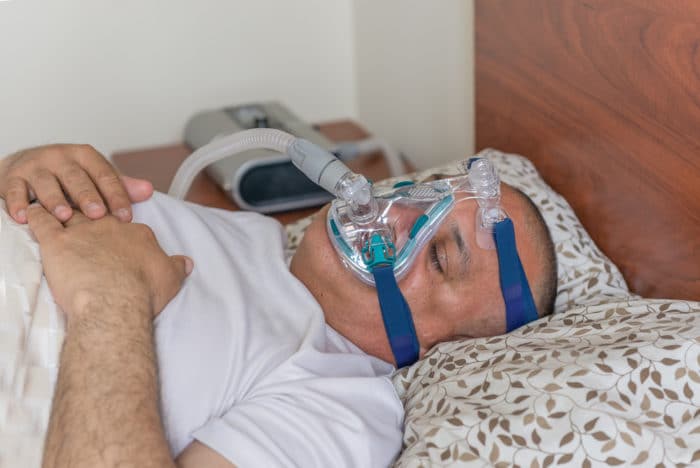
8) Surgery. For some cases, a doctor may suggest surgery to remove tonsils, adenoids, or excess tissues blocking the airway. You can read about surgical options here.
So, what is sleep apnea?
- a common disorder
- interrupts breathing, limits oxygen to the body, and keeps you from getting restful sleep
- can cause snoring
- can have serious & life-threatening health effects
- three basic types, obstructive (airway mechanical problems), central (brain-body communication problems), or complex (mechanical & communication problems)
- obstructive apnea is the most common
- treatable
You may also be interested in:
What’s the leading cause of sleep apnea?
The quickest sleep apnea treatments you can get
Can sleep apnea cause bipolar?
Is sleep apnea bad? – 5 ways it can wreck your life
Can losing weight help sleep apnea?
12 things to try if your husband is always falling asleep
Can pain make sleep apnea worse?
Does sleep apnea reduce life expectancy?
Yes, skinny women get sleep apnea too
Can sleep apnea cause pain and body aches?
Can sleep apnea cause shoulder pain?
9 Things to try to treat sleep apnea yourself
Can sleep counseling really help your sleep apnea?
How to get help for sleep apnea if you don’t have insurance
Best online sleep apnea forums and resources
Hear directly from experts and patients about insomnia diagnosis & treatment
Hear what experts and patients have to say about sleep apnea and CPAP
The latest sleep apnea devices – everything you need to know
CPAP made my cold worse: How to get sleep while dealing with a sore throat and other symptoms
14 remedies for sleep apnea and pain
How sleep apnea & daytime panic attacks are linked and what to do about it
Foods that help sleep apnea – 5 to try for better sleep
Sleeping upright with sleep apnea – What we know and 3 things to try
Worried sleep apnea is ruining your marriage? Three practical tips for survival and recovery.
Sleep apnea and vaping, it’s more serious than you think
Sleep apnea and dizziness: What we know and 7 things you can try
Does sleep apnea get worse over time?
Sleeping with someone with sleep apnea – 6 things to try
Will sleep apnea snoring stop after pregnancy?
Looking for a used CPAP machine? – Where to look, what to avoid
12 things to try if your husband is always falling asleep
Can CBD help sleep apnea? – 4 ways it might
Connect with us:
About Us
Better Sleep Simplified® was founded as a place for you to get clear and well-researched information.
Our goal is to make sure you know about your options so that you take action sooner rather than later.
Check us out on YouTube:
Watch and Learn
Helpful sleep tips, interesting sleep facts and statistics you want to know about
Affiliate Disclosure
This site is a participant in the Amazon Services LLC Associates Program and other affiliate advertising programs designed to provide a means for sites to earn advertising fees by advertising and linking to them.
Important: BetterSleepSimplified.com is for informational purposes only and is not intended or implied to be a substitute for professional medical advice, diagnosis, or treatment. Always consult a physician for sleep and health concerns. See additional information.
